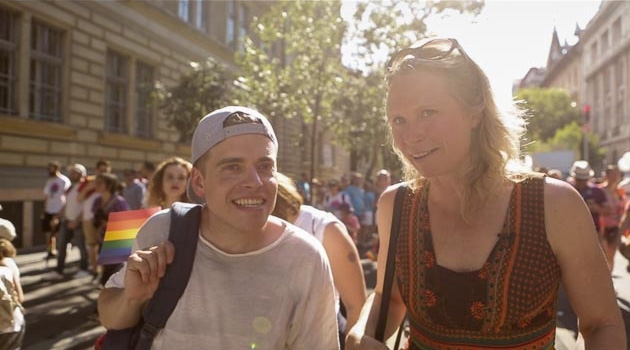Premier of research documentary on alternative entrepreneurship
An ethnographic research documentary on alternative entrepreneurship in Hungary will premier on the 16th of May. We talked to researchers Annika Skoglund and David Redmalm, members of the research group that created the documentary Pride - Alternative Entrepreneurship Enjoyed to find out more.
What’s happening at the premier?
“We’ll be showing our documentary about the Hungarian company Prezi and alternative entrepreneurship in relation to the Pride parade. We are interested in things including the significance of a company getting involved in the Pride parade - what are the advantages, and are there any problems? After the screening, we will discuss the film with the audience and an invited panel,” says David Redmalm, a researcher with the Department of Sociology.
What is alternative entrepreneurship?
“Alternative entrepreneurship is a general term for various types of entrepreneurship wherein companies consider it a natural aspect of their core business to assume greater responsibility for an increasing number of social problems” says Redmalm.
Is that the same thing as “corporate social responsibility”, CSR, where companies get involved in various contexts outside the business?
“No. CSR is a form of management and entrepreneurship has nothing to do with management. On the contrary, entrepreneurship is defined as something other than management. Entrepreneurship is the creative endeavour that can disrupt an established order, while management seeks to maintain the order. In the same way, one differentiates between CSR and alternative entrepreneurship. CSR is carried out by a department within the company, often as a defense against criticism or potential future criticism. Alternative entrepreneurship seems to be more closely linked to a whole organisational culture, where initiatives are taken across the entire organisation,” says Annika Skoglund, associate senior lecturer at the Department of Engineering Sciences.
Why did you make a documentary?
“We wouldn't be able to see or find alternative entrepreneurship using conventional methods of researching entrepreneurship, which would only allow us to study ordinary entrepreneurship. So, we needed a new method to capture the essence of alternative entrepreneurship. Video is used in other fields of research, but not often in entrepreneurship, business administration or organisation research,” says Skoglund.
How exactly can you pin down alternative entrepreneurship in film?
“Ethnography is always about seeking experiences along with the other participants; you cannot fully understand something until you understand it from the inside. By filming interviews and participating in the Pride parade and then transcribing all the material, we can get to the core of alternative entrepreneurship better than we could using many other methods, and communicate that to the people who see the film,” says Skoglund.
“Understanding often comes through the details. For example, the atmosphere was very tense ahead of the 2017 Pride parade, and once we had passed through all the security barriers to enter the parade, there was a bang and I crouched down immediately, scared of being shot. But it turned out that balloons had burst. The Pride parade in Hungary is utterly different to how it is in Sweden, with a lot more police and barriers. It may sound good for the company to participate in Pride, with employees walking in the parade, but carrying that out in a safe way is something else again, and I don’t think people will understand that unless they are there or see our film,” says Redmalm.
“By making a documentary, we can also more clearly communicate the research process and results, and easily show it to students, for example. We can also reach the public, for whom a film is more accessible than a scientific article,” says Skoglund.
Can a film actually be considered a research publication?
“Yes, film is beginning to emerge as a form of research publication. We have made two previous documentaries, one of which is about to be published in a scientific journal, following peer review, along with a brief article covering mainly methods and discussion,” says Skoglund.
Why did you study Prezi and the Pride parade in Hungary in particular?
“The Pride Festival in Hungary has grown massively thanks to corporate involvement. At first, only activists marched, but Prezi started participating in 2009 under its corporate logo, and more companies have joined since then. It has become something that addresses a wider public, in addition to people who identify as LGBTQ,” says Redmalm.
“Prezi is interesting because their business concept involves a presentation program that is partially based on a democratic philosophy. The program is meant to help people get a message across. And the better we can spread messages, the more civil dialogue we will have, along with a more open society and greater understanding. The involvement in the Pride parade is only one of many examples of alternative entrepreneurship within Prezi. For example, they donate to a Romany village ever year and have started an umbrella organisation for companies that are promoting transparency. Wanting to know that you work for a company that takes responsibility is a relatively common phenomenon in the west, but that is not the case in Hungary. Prezi is leading the way in this process in Hungary,” says Skoglund.
What are your hopes for the May 16th premier?
“We are hoping a lot of people will be there - students, researchers and members of the public,” says Redmalm.
“And that the audience asks a lot of questions. We want to generate discussion and encourage people to ask questions of the panel,” says Skoglund.
Anders Berndt

